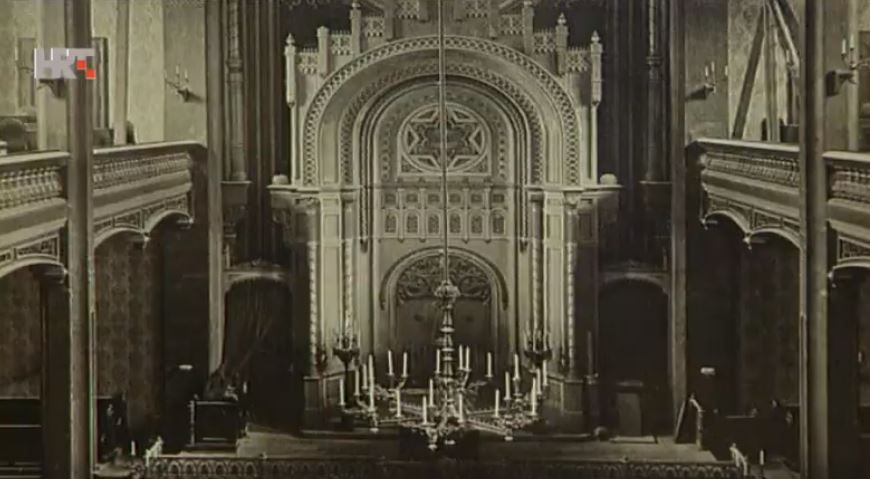The Synagogue was demolished on October 10, 1941.
Have you ever noticed a big empty space to your left while walking from Ban Jelačić Square to Zrinjevac? If you look more closely, you’ll see a plaque on the wall, honouring the synagogue that used to be located there until WWII.
The Synagogue was constructed and consecrated in 1867, when Croatia was part of the Kingdom of Croatia-Slavonia (within the Austrian Empire).
Croatian Radiotelevision, screenshot
There were some 700 members of the Jewish community in Zagreb in the mid-19th century, so, in 1861, a property was purchased in Maria Valeria Street (now Praška Street) in order to build a Synagogue.
Architect Franjo Klein was commissioned to build it and he decided to model it after the Vienna Synagogue, known as Leopoldstädter Tempel (which was also demolished before WWII), in what is known as the Moorish Revival Style - buildings were filled with ornaments and Moorish details. There were three naves and the main façade had three rounded arched entrances.

It took one year to complete the building, and the overall impression was very positive, with the exception being the introduction of the organ, whose introduction some synagogue-goers did not like, so they started holding their service separately.
Separate services became a necessity, and not a matter of choice, in the 1920s, when the number of the Jewish community members came close to 6,000, until it almost doubled by the 1940s.

When the nationalist Ustaša regime came into power and Croatia was known as the Independent State of Croatia in 1941, Zagreb mayor Ivan Wermer ordered the demolition of the Synagogue on October 10, 1941. The decision was justified by the claim that the Synagogue was not in line with the city’s urban plan.


The demolition of the Synagogue was photographed in detail in order for it to be shown at the Anti-Semitic Exhibition that took place in Zagreb’s Art Pavilion in 1942, the year the Synagogue was demolished. The process took almost a year to finish because it was done by hand, so the construction material could be used elsewhere (the façade was used for renovating the façade of St. Peter’s Church in Vlaška Street, for example).
The only surviving artefacts can be found in the Zagreb City Museum – a wash-basin and two memorial tables.
A prefabricated department store building was built on the location in 1959, but it burnt down in 1980, allegedly due to the fact that a janitor left a radiator on.


The Jewish Community and the City have been talking about renovating the Synagogue or building a memorial centre there for quite some time now, but there has been some disagreement over the design (contemporary or a replica of the original), so a new plan hasn’t been made until 2014, when the Jewish Community presented plans for a new, 10,000 m2 Jewish centre and synagogue.
All photos from Zagreb - kakav je bio nekada, Facebook.



